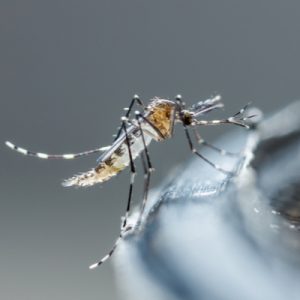Here in Charlotte, The one good thing about winter fast approaching is that there will be no more mosquitoes soon. That means no more annoying bites and no more mosquitoes sneaking into your home to bite you in your sleep. It also means that the threat of mosquito-borne diseases is gone for the season.
Once temperatures start staying consistently below 50 degrees Fahrenheit, mosquitoes will lay one final batch of eggs and start to go dormant. Mosquito eggs can survive in frozen water until spring when they hatch. 
How do Mosquitoes Survive the Winter?
Since mosquitoes are cold-blooded creatures, they can’t regulate their own body heat like mammals. When temperatures start to dip, mosquitoes start to slow down. When temperatures get below 50 degrees, they must seek out a place to hibernate or freeze to death.
Most people think the winter kills off mosquitoes but these insects have been around for over 100 million years. They have faced their share of harsh weather and yet, here they are. When it comes to surviving the winter, mosquitoes have several strategies.
Some species can overwinter as adult females in logs, along riverbeds, or in animal burrows. After mating in the fall, male mosquitoes die while the females find hibernation spots along frozen river banks, animal burrows, and hollow logs. Some species lay eggs before they die that can survive the winter in frozen water. In the spring, warm temperatures trigger them to hatch. There are even some species of mosquitoes that can overwinter underground in the larval stage.
A Mosquito’s Life
Once eggs hatch in the spring it only takes a few days for them to become adults. Males and females go their separate ways after they reach the adult stage. Males feed on nectar from flowers while females, well you know what females feed on. After she has gotten her fill of blood, the female will deposit her eggs within 48 hours the eggs will hatch. In less than a week the larvae will join the swarms in your backyard.
Mosquito Prevention in Winter
So now that you know that mosquitoes don’t just simply vanish in the winter, it’s time to take some steps to make sure they do. By following the mosquito control tips and tricks we have taught you, you can put a sizable dent in the mosquito population in your yard.
Get Rid of all Standing Water
As you now know, mosquitoes can lay their eggs in water that is at or below freezing temperatures. Controlling mosquitoes is as easy as walking around your yard and dumping out all the water you find before it freezes. If it’s frozen, just dump the ice out on the ground so that when it melts in the spring it can be absorbed by the ground.
Clean out your Water Features
Your water features should be drained in the winter to prevent damage from freezing and thawing. Birdbaths and fountains should be emptied of their water and stored properly for the winter. Any amount of remaining water in the bottom could be enough for mosquitoes to lay their eggs in.
Call The Pest Control Experts at Cramer
If mosquitoes are driving you and your family crazy, call the professionals at Cramer Pest Control. We have years of experience dealing with pests of all shapes and sizes. If you want to protect your home from mosquitoes next year, then ask about our outdoor pest control program
Own a business? With our Commercial Pest Control program, we can save your small business from being overrun with pests.
Don’t wait for the problem to get out of control, call us now at (704) 763-0204 or (803) 802-7540 to get started. You can also contact us here for more information. Don’t forget to follow us on Facebook for the latest deals and check our blog for monthly pest control tips and tricks.
No More Bites: Where Do Mosquitoes Go In The Winter in North Carolina and South Carolina?
Protecting North Carolina and South Carolina
